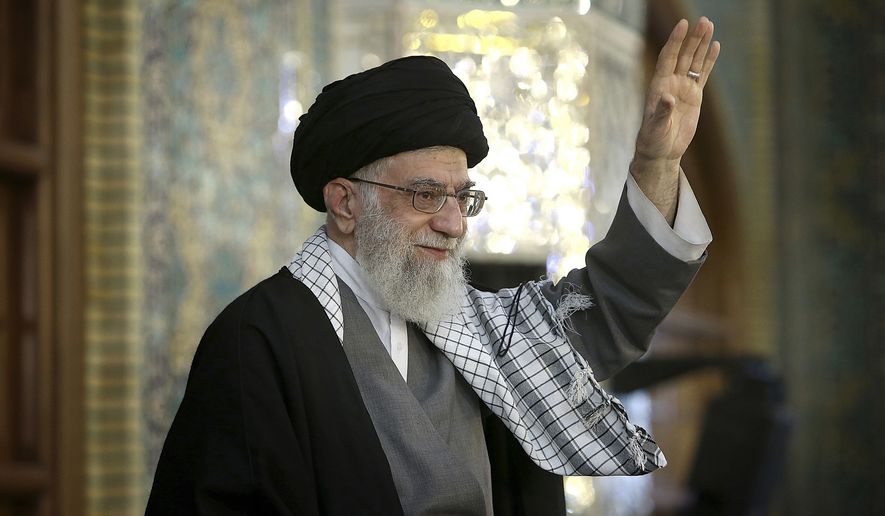President Trump on Wednesday ordered a new round of economic sanctions against Iran, punishing the country for its growing ballistic missile program while also quietly extending Obama-era sanctions relief mandates tied to the 2015 nuclear deal with Tehran that Mr. Trump harshly criticized on the campaign trail last year.
The new sanctions levied by the Treasury Department on Wednesday are the latest in a series of recent actions by the Trump administration against Iran, and come just two days before Iran holds a presidential election in which President Hassan Rouhani, prime architect of the nuclear deal, is trying to hold off a challenge from hard-liner Ebrahim Raisi.
Two Iranian nationals and a Chinese national, along with an Iranian-based company and three Chinese companies targeted by the Treasury Department, constituted a “network that supplied missile-applicable items to a key Iranian defense entity,” said Acting Assistant Secretary of State for Near Eastern Affairs Ambassador Stuart Jones.
“The action reflects concern with Iran’s continued development of ballistic missiles” in a continuing effort to “pursue missile-related technologies capable of delivering a nuclear weapon,” he added in a statement.
Mr. Trump has done a delicate diplomatic two-step on Iran since taking office, sharply criticizing the nuclear deal and what U.S. officials say is Iran’s continuing aggression in the region, but stopping short of pulling out of the international accord negotiated under President Obama.
Wednesday’s announcements come on the heels of a State Department decision to impose, for the first time, sanctions against Iran tied to its reported human rights violations. Those sanctions went into place last month, according to Mr. Jones.
But Mr. Trump also quietly extended sanctions relief for Iran mandated under the nuclear deal. The extension will essentially keep the Iran nuclear deal in place for the foreseeable future.
Despite U.S. unhappiness with Iran’s adherence to parts of the nuclear accord, Mr. Trump has faced pressure against walking away from the deal, for fear the U.S. will be isolated and other international powers will not re-impose their own sanctions on Iran.
Dissolving the nuclear pact with Iran during Mr. Trump’s first 100 day would “create a crisis on the front end [of his term],” Senate Foreign Relations Committee Chairman Bob Corker, Tennessee Republican, said at the time.
Trita Parsi, who heads the National Iranian American Council and supported the 2015 deal, praised Wednesday’s decision to abide by the sanctions waivers in the nuclear deal.
“The Trump administration has once again grudgingly acknowledged that Iran continues to abide by its obligations under the agreement,” he said in a statement Wednesday. “It is undeniable that the deal is in America’s national interest as it has blocked all of Iran’s pathways to a nuclear bomb. … The longer the deal lasts, the better off the United States will be.”
The decision to extend the waivers buys the White House more time to develop a comprehensive strategy on Tehran. Michael Flynn, President Trump’s first national security adviser, said in January that Iran was being put “on notice” over its regional aggressive, and Secretary of State Rex W. Tillerson delivered a harsh assessment of Tehran’s policies last month while confirming the Trump administration was thoroughly reviewing its policies on Iran.
“Mr. Trump needs to take his time developing a comprehensive strategy to roll back and subvert Iranian aggression,” said Mark Dubowitz, chief executive for the Washington, D.C.-based Foundation for Defense of Democracies. “Only once U.S. leverage is restored can he address the deal’s fatal flaws.”
Mr. Trump will visit Iran’s chief regional rival, Saudi Arabia, during his first overseas trip as president this weekend. Saudi Arabia strongly opposed the 2015 nuclear deal. The White House upped the ante on Wednesday, announcing one of the key goals during his visit to Riyadh will be to create and help arm an “Arab NATO” designed to fight terrorist groups and counter Iranian influence in the region.
• Carlo Muñoz can be reached at cmunoz@washingtontimes.com.




Please read our comment policy before commenting.